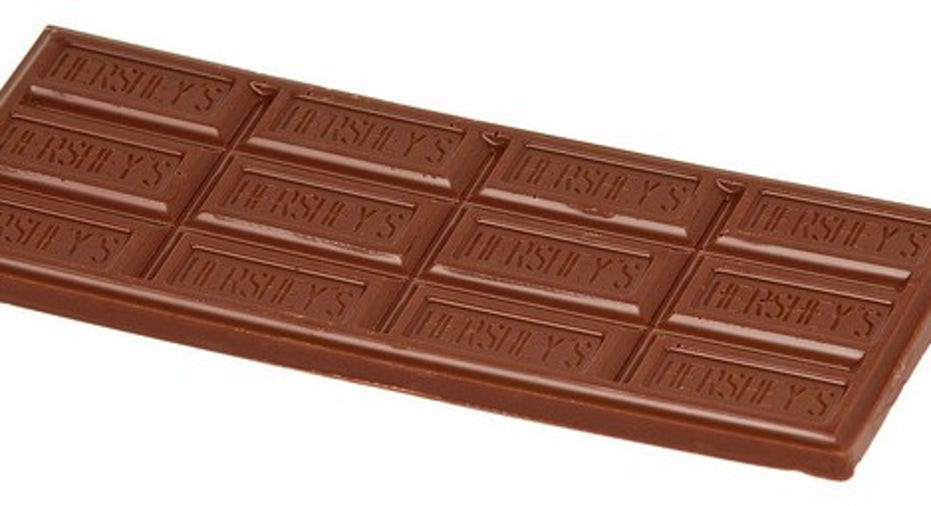How Much Could Mondelez Pay for Hershey Co?

On June 30, snack foods giant Mondelez made a $23 billion bid for chocolate maker Hershey . Hershey's board unanimously rejected the $107 per share offer, which represented a 10% premium to its closing price before the bid.
That decision wasn't surprising, since Hershey has rejected numerous takeover offers in the past. But could Mondelez, which owns well-known staples like Oreo, Chips Ahoy, and Cadbury, eventually sweeten the offer to the point that Hershey agrees to a deal?
Image Source: Pixabay
Why Mondelez needs Hershey
The packaged foods market is a slow growth one which is currently being crushed by currency headwinds. Last quarter, Mondelez revenue fell17% annually and declined across all geographic regions. But on an organic basis, which excludes currency impacts and acquisitions, sales rose 2% and improved across all overseas markets.
Buying Hershey's big U.S. business (89% of its sales came from North America last quarter) would reduce the weight of Mondelez' overseas businesses and the impact of the strong dollar. It would also create the world's biggest candy maker with an 18% market share and bring Hershey's brands to more overseas markets. This plan notably defies activist investor Nelson Peltz's attempts to pivot Mondelez away fromcandy altogether.
However, the acquisition should satisfy Mondelez' other big activist investor, Bill Ackman, who wants the company to either sell itself or grow its revenue faster. Based on both companies' projected sales in 2016, buying Hershey would boost Mondelez revenue by 28% to $34 billion. Profitability would also improve, thanks to Hershey's higher operating margins.
Image Source: Pixabay
How much more could Mondelez pay?
At $107, Hershey is valued at 47 times trailing earnings. That's a whopping multiple for a company which grew itsadjusted earnings by just 3.5% in 2015. It's also much higher than the average price-to-earnings of 29 timesfor the confectionery industry. Much of Hershey's 20% rally in 2016 was fueled by investors pivoting away from riskier stocks toward stable, mainly U.S.-based consumer staples plays with healthy dividends.
For reference, Danone's recent $10 billion purchase ofWhiteWave Foods valued the company at 57 times earnings, but WhiteWave had posted 24% adjusted earnings growth last year. WhiteWave's earnings are expected to rise18.5% this year, but Hershey's are only expected to grow 3%.
Returning with a higher bid could be risky for Mondelez, since Moody'srecently warnedthat the deal could impact Mondelez' credit rating. Investors would also likely question the intelligence of paying over $23 billion for a company which generated just $513 million in net income last year.
Learning from Wrigley's mistakes
The Hershey Trust, a $12 billion charity created by founder Milton Hershey a century ago, is the company's controlling shareholder with 81% of the vote. Back in 2002, theTrust put the company up for sale. Wrigley, now owned byMars, nearly won the auction with a $12.5 billion bid which represented a 42% premium over Hershey's price before the process started. That offer valued the company at over 50 times earnings.
But in a surprising eleventh hour decision, the Trust voted to halt the auction in response to ongoing protests in the company's namesake city in Pennsylvania. Many protesters opposed the idea of selling the company which the entire city was founded upon, as well as Wrigley's proposal to rename the combined company "Wrigley Hershey".
Taking note of Wrigley's failed bid, Mondelez pledged to keep the company's headquarters in Hershey and to use Hershey as the combined entity's new name. Unfortunately, it seems like fixing those two issues didn't win over the board.
What's next for Mondelez?
Mondelez probably won't raise its bid dramatically. I believe that the most that it could reasonably raise the bid would be to around $115 per share, based on Hershey's multiple of 50 at that price.
That would value Hershey at nearly $25 billion -- which would still be a huge purchase for Mondelez, which finished last quarter with just $1.3 billion in cash and equivalents and $13.8 billion in long-term debt. This means that Mondelez must finance the deal with more debt or its own stock.
I believe that Mondelez will simply wait for now, since its initial bid has seemingly triggered a conflict within the Hershey Trust. Board member Joan Steel recently resigned without anyexplanation, hinting that some board members might be in favor of a deal. Investors shouldn't buy Hershey expecting a new offer -- since the upside potential will likely be limited -- but they should see if Mondelez can pull off oneof the largest deals in packaged foods history.
The article How Much Could Mondelez Pay for Hershey Co? originally appeared on Fool.com.
Leo Sun has no position in any stocks mentioned. The Motley Fool owns shares of and recommends WhiteWave Foods. The Motley Fool recommends Moody's. Try any of our Foolish newsletter services free for 30 days. We Fools may not all hold the same opinions, but we all believe that considering a diverse range of insights makes us better investors. The Motley Fool has a disclosure policy.
Copyright 1995 - 2016 The Motley Fool, LLC. All rights reserved. The Motley Fool has a disclosure policy.



















